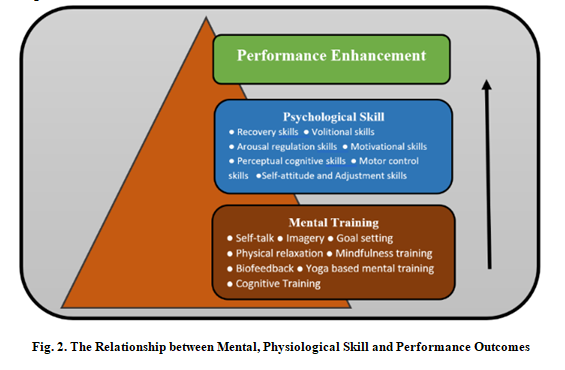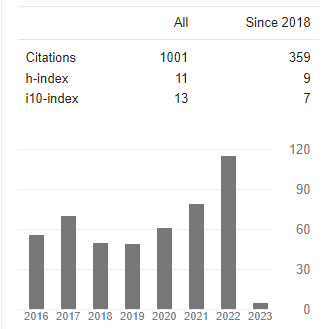ROLE OF MENTAL TRAINING IN SPORTS PERFORMANCE: A CRITICAL APPRAISAL
Abstract
Mental training is very much in vogue, yielding sterling results in sports and athletic performances. A growing body of research in this area constantly exemplifies that mental training is becoming an indispensable part in athletic preparation programme, particularly when physical training inevitably becomes more and more one-sided approach to build a complete athlete. The main objective of this review article is to investigate and understand the role of mental training in sports performance. Studies that matched and fulfilled the primary objective of the article were considered, reviewed, presented systematically and interpreted critically. Different types of mental technique such as self-talk, imagery, goal setting, physical relaxation, biofeedback, mindfulness training, yoga based mental training and cognitive training have been reported as instrumental to enhance sports performance. Mental training develops an athlete’s different psychological skills such as recovery skills, volitional skills, arousal regulation skills, copping skills, motivational skills, perceptual cognitive skills, motor control skills, self-skills and life skills. These skills help an athlete to overcome different difficult situations in the competition and motivate to set a high aspiration. This review study unfolds some fundamental concepts of mental training and its application to nurture and prepare an athlete for better performance.
Downloads
References
Cox R. H. (2012). Sport psychology: Concepts and applications. McGraw-hill, New York
Ryba T. V., Stambulova N. B., &Wrisberg C. A. (2005). The Russian origins of sport psychology: A translation of an early work of AC Puni. Journal of Applied Sport Psychology, 17(2), 157-169. DOI: 10.1080/10413200590932461
Salmela J. H. (1984). Comparative sport psychology. Psychological foundations of sport, 23-34.
Green C. D. (2003). Psychology strikes out: Coleman R. Griffith and the Chicago Cubs. History of Psychology, 6(3), 267.
Kornspan A. S., & MacCracken M. J. (2003). The use of psychology in professional baseball: The pioneering work of David F. Tracy. Nine: A Journal of Baseball History and Culture, 11(2), 36-43.
Suinn R. M. (1972). Behavior rehearsal training for ski racers. Behavior Therapy, 3(3), 519-520.
Vealey R. S. (2007). Mental skills training in sport. In G. Tenenbaum & R. C. Eklund (Eds.), Handbook of sport psychology (pp. 287–309). John Wiley & Sons, Inc.
Murphy S. (2009). The sport psych handbook. Champaign, IL: Human Kinetics.
Mellalieu S., & Hanton S. (Eds.). (2008). Advances in applied sport psychology. Taylor & Francis.
Rothlin P., Birrer D., & Horvath S. (2016). Psychological skills training and a mindfulness-based intervention to enhance functional athletic performance: design of a randomized controlled trial using ambulatory assessment. BMC psychology, 4(1), 1-11.
Patrick T. D., &Hrycaiko D. W. (1998). Effects of a mental training package on an endurance performance. The sport psychologist, 12(3), 283-299.
Kendall G. J. (1988). The effects of mental rehearsal, relaxation and self-talk techniques on basketball game performance (Master's thesis).
Weinberg R. S., Seabourne T. G., & Jackson A. (1981). Effects of visuo-motor behavior rehearsal, relaxation, and imagery on karate performance. Journal of Sport and Exercise Psychology, 3(3), 228-238.
Birrer D., & Morgan G. (2010). Psychological skills training as a way to enhance an athlete's performance in high‐intensity sports. Scandinavian journal of medicine & science in sports, 20, 78-87.
Kolata P. (2007). I’m not really running; I’m not really running . . . The New York Times. Retrieved 6 December 2007, from www.nytimes.com/2007/12/06/health/nutrition/ 06Best.html.
Hardy J, Gammage K, & Hall C. (2001). A descriptive study of athlete self-talk. The Sport Psychologist, 15(3), 306–318.
Rushall B. S., Hall M., Roux, L., Sasseville J. and Rushall A. C. (1988). Effects of three types of thought content instructions on skiing performance. The Sport Psychologist, 2, 283–297
Landin D. and Hebert E. P. (1999). The influence of self-talk on the performance of skilled female tennis players. Journal of Applied Sport Psychology, 11, 263–282.
Johnson J. M., Hrycaiko D. W., Johnson G. V., & Halas J. M. (2004). Self-Talk and Female Youth Soccer Performance. The Sport Psychologist, 18, 44-59. https://doi.org/10.1123/tsp.18.1.44
Hardy J., Hall C. R., & Hardy L. (2004). A note on athletes' use of self-talk. Journal of Applied Sport Psychology, 16(3), 251-257.
Hatzigeorgiadis A, Theodorakis Y &nikoszourbanos (2004) Self-Talk in the Swimming Pool: The Effects of Self-Talk on Thought Content and Performance on Water-Polo Tasks, Journal of Applied Sport Psychology, 16:2, 138-150, DOI: 10.1080/10413200490437886
Walter N., Nikoleizig L., & Alfermann D. (2019). Effects of self-talk training on competitive anxiety, self-efficacy, volitional skills, and performance: An intervention study with junior sub-elite athletes. Sports, 7(6), 148.
Park S. H., Lim B. S., & Lim S. T. (2020). The effects of self-talk on shooting athletes’ motivation. Journal of sports science & medicine, 19(3), 517.
Vealey R. S., & Greenleaf C. A. (2001). Seeing is believing: Understanding and using imagery in sport. Applied sport psychology: Personal growth to peak performance, 4, 247-272.
Cumming, J., & Williams, S. E. (2012). The role of imagery in performance. In S. M. Murphy (Ed.), The Oxford handbook of sport and performance psychology (pp. 213–232). Oxford University Press. https://doi.org/10.1093/oxfordhb/9780199731763.013.0011
Hall C. R., Mack D. E., Paivio A., &Hausenblas H. A. (1998). Imagery use by athletes: development of the Sport Imagery Questionnaire. International Journal of Sport Psychology.
Evans L., Jones L., & Mullen R. (2004). An imagery intervention during the competitive season with an elite rugby union player. The Sport Psychologist, 18(3), 252-271.
Cumming J., & Hall C. (2002). Athletes’ use of imagery in the off-season. The Sport Psychologist, 16(2), 160-172.
Omar-Fauzee M. S., Daud W. R. B. W., Abdullah R., & Rashid S. (2009). The effectiveness of imagery and coping strategies in sport performance. European Journal of Social Sciences, 9(1), 97-108.
Morris T., Spittle M., & Watt A. P. (2005). Imagery in sport. Human Kinetics.
White A., & Hardy L. (1998). An in-depth analysis of the uses of imagery by high-level slalom canoeists and artistic gymnasts. The Sport Psychologist, 12(4), 387-403.
Locke E. A., Shaw K. N., Saari L. M., & Latham, G. P. (1981). Goal setting and task performance:1969–1980. Psychological bulletin, 90(1), 125.
Mellalieu D.S, Hanton S, O'brien M. (2006) The Effects of Goal Setting on Rugby Performance. 39(2): 257–261.doi: 10.1901/jaba.2006.36-05
O’Brien M., Mellalieu S., & Hanton S. (2009). Goal-setting effects in elite and nonelite boxers. Journal of Applied Sport Psychology, 21(3), 293-306.
Gould, D. (2001). Goal setting for peak performance. Applied sport psychology: Personal growth to peak performance, 4, 190-205.
Burton D., & Naylor S. (2002). The Jekyll/Hyde nature of goals: Revisiting and updating goal-setting in sport. Advances in sport psychology, 2, 459-499.
Durand-Bush N., &Salmela J. H. (2002). The development and maintenance of expert athletic performance: Perceptions of world and Olympic champions. Journal of applied sport psychology, 14(3), 154-171.
Ortiz J., & Grange L. L. (2006). Efficacy of relaxation techniques in increasing sport performance in women golfers. The sport journal, 9(1).
Parnabas V. A., Mahamood Y., Parnabas J., & Abdullah N. M. (2014). The relationship between relaxation techniques and sport performance. Universal Journal of Psychology, 2(3), 108-112.
Liang D., Chen S., Zhang W., Xu K., Li Y., Li D., & Liu C. (2021). Investigation of a Progressive Relaxation Training Intervention on Precompetition Anxiety and Sports Performance Among Collegiate Student Athletes. Frontiers in Psychology, 11, 617541.
Groslambert A., Candau R., Grappe F., Dugue B., &Rouillon J. D. (2003). Effects of autogenic and imagery training on the shooting performance in biathlon. Research quarterly for exercise and sport, 74(3), 337-341.
Hashim H. A., Hanafi H., & Yusof A. (2011). The effects of progressive muscle relaxation and autogenic relaxation on young soccer players’ mood states. Asian journal of sports medicine, 2(2), 99.
Crane R. S., Brewer J., Feldman C., Kabat-Zinn J., Santorelli S., Williams J. M. G., &Kuyken W. (2017). What defines mindfulness-based programs? The warp and the weft. Psychological medicine, 47(6), 990-999.
Kabat-Zinn J. (1994). Wherever you go, there are you: Mindfulness meditation in everyday life. New York: Hyperion.
Cottraux J. (2007). Thérapie cognitive et emotions: Latroisième vague [cognitive therapy and emotions: the third wave]. Paris: Elsevier Masson.
Nelson D. (2018). The Impact of Mindfulness Training on Competitive Athletic Performance. Intuition: The BYU Undergraduate Journal of Psychology, 13(3), 6.
Creswell J. D. (2017). Mindfulness interventions. Annual review of psychology, 68, 491-516.
Atherne C., Moran A. P., & Lonsdale C. (2011). The effect of mindfulness training on athletes’ flow: An initial investigation. The Sport Psychologist, 25(2), 177-189.
Nien J. T., Wu C. H., Yang K. T., Cho Y. M., Chu C. H., Chang Y. K., & Zhou C. (2020). Mindfulness training enhances endurance performance and executive functions in athletes: An event-related potential study. Neural Plasticity, 2020.
Chen M., &Meggs J. (2020). The effects of Mindful Sport Performance Enhancement (MSPE) training on mindfulness, and flow in national competitive swimmers. Journal of Human Sport and Exercise.
Cherup N., &Vidic Z. (2019). Mindfulness with collegiate gymnasts: Effects on flow, stress and overall Mindfulness levels. Int. J. Phys. Educ. Fit. Sports, 8, 19-31.
Buhlmayer L., Birrer D., Rothlin P., Faude O., & Donath L. (2017). Effects of Mindfulness Practice on Performance-Relevant Parameters and Performance Outcomes in Sports: A Meta Analytical Review. Sports medicine (Auckland, N.Z.), 47(11), 2309–2321. https://doi.org/10.1007/s40279-017-0752-9
Blumenstein B., & Orbach I. (2014). Biofeedback for sport and performance enhancement. DOI:10.1093/oxfordhb/9780199935291.013.001
Schwartz G. E. (1979). Disregulation and systems theory: A biobehavioral framework for biofeedback and behavioral medicine. Biofeedback and self-regulation, 19-48.
Pop-Jordanova N., &Demerdzieva A. (2010). Biofeedback training for peak performance in sport- case study. Macedonian journal of medical sciences, 3(2), 113-118.
Bar-Eli M., & Blumenstein B. (2004). Performance enhancement in swimming: The effect of mental training with biofeedback. Journal of Science and Medicine in Sport, 7(4), 454-464.
Paul M., Garg K., & Sandhu J. S. (2012). Role of biofeedback in optimizing psychomotor performance in sports. Asian journal of sports medicine, 3(1), 29.
Beauchamp M. K., Harvey R. H., & Beauchamp P. H. (2012). An integrated biofeedback and psychological skills training program for Canada’s Olympic short-track speedskating team. Journal of clinical sport psychology, 6(1), 67-84.
Colzato L. S., &Kibele A. (2017). How different types of meditation can enhance athletic performance depending on the specific sport skills. Journal of cognitive enhancement, 1(2), 122-126.
SINGH SIDHU, A., & SINGH, M. (2022). KINEMATICAL ANALYSIS OF HURDLE CLEARANCE TECHNIQUE IN 110M HURDLE RACE. International Journal of Behavioral Social and Movement Sciences, 4(2), 28–35. Retrieved from https://ijobsms.org/index.php/ijobsms/article/view/267
Singh, A., & Singh , D. M. (2013). PROMOTION OF RESEARCH CULTURE –ENHANCING QUALITY IN HIGHER EDUCATION. International Journal of Behavioral Social and Movement Sciences, 2(2), 202–208. Retrieved from https://ijobsms.org/index.php/ijobsms/article/view/152
Solberg E. E., Berglund K. A., Engen O., Ekeberg O., & Loeb M. (1996). The effect of meditation on shooting performance. British journal of sports medicine, 30(4), 342-346.
Datta R,.& Goswami J. (2019). Effect of Trataka on the Shooting Performance of District Level Shooters. Journal of Advances and Scholarly Researches in Allied Education Vol. 16, Issue No. 6 ISSN 2230-7540
Slimani M., Bragazzi N. L., Tod D., Dellal A., Hue O., Cheour F., &Chamari K. (2016). Do cognitive training strategies improve motor and positive psychological skills development in soccer players? Insights from a systematic review. Journal of sports sciences, 34(24), 2338-2349.
Tod D., Edwards C., McGuigan M., & Lovell G. (2015). A Systematic Review of the Effect of Cognitive Strategies on Strength Performance. Sports medicine (Auckland, N.Z.), 45(11), 1589–1602. https://doi.org/10.1007/s40279-015-0356-1
De Witt D. J. (1980). Cognitive and biofeedback training for stress reduction with university athletes. Journal of Sport and Exercise Psychology, 2(4), 288-294.

Copyright (c) 2024 Palash Pramanik, Sridip Chatterjee

This work is licensed under a Creative Commons Attribution 4.0 International License.














